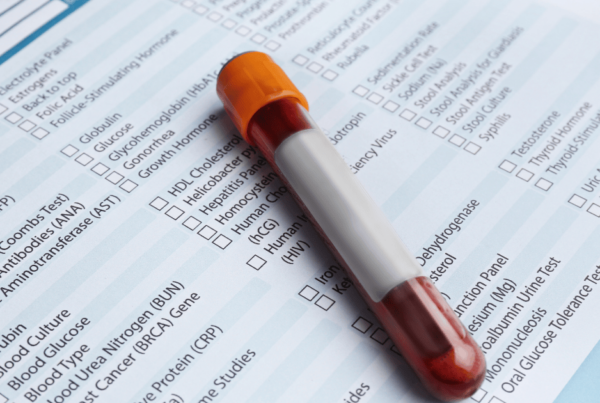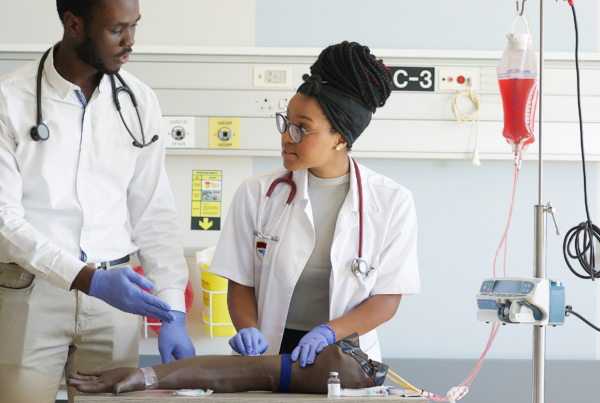The intricate world of healthcare relies heavily on the analysis of blood. Phlebotomists play a vital role in this process, meticulously collecting blood samples that fuel diagnoses, treatments, and medical research. But if you’re considering a career in phlebotomy, a crucial question arises: Do You Need a Degree to Be a Phlebotomist?
The answer is both surprising and liberating: There’s no mandatory college degree requirement for phlebotomists. This opens the door for individuals with a high school diploma/GED to embark on a rewarding path in healthcare. However, let’s delve deeper and explore the educational landscape of phlebotomy.
Unveiling the Path to Phlebotomy: Degree or Not?
| Key Takeaway: Do You Need a Degree to Be a Phlebotomist? |
| An associate’s degree, while not required, can strengthen your resume and open doors to broader healthcare opportunities. |
| A bachelor’s degree can position you for advanced roles in phlebotomy or related healthcare fields. However, it’s not required for entry-level phlebotomy positions. |
| Phlebotomy Now School’s program is a direct route to becoming a certified phlebotomist, preparing you with the skills and support needed for success. |
The Essentials of Phlebotomy: A Skill You Can Master
Phlebotomists are the backbone of blood collection. They perform venipunctures (needle insertions into veins) to extract blood samples used for various purposes, including:
- Laboratory testing: Identifying potential health concerns through blood analysis.
- Blood transfusions: Replenishing blood loss or providing vital components during medical procedures.
- Medical studies: Contributing to groundbreaking research and advancements in healthcare.
Phlebotomists can work in diverse healthcare settings, such as hospitals, clinics, blood banks, and laboratories.
Educational Pathways to Phlebotomy Success
While a degree isn’t mandatory, there are various educational avenues to becoming a certified phlebotomist:
- Phlebotomy Technician Program at Phlebotomy Now School:
Phlebotomy Now School offers a comprehensive phlebotomy technician program designed to equip you with the essential skills and knowledge to excel in this rewarding field. Our program features:
- Experienced Instructors: Our instructors are seasoned phlebotomists passionate about sharing their expertise and helping you succeed.
- Hands-on Training: We prioritize practical experience through simulated labs and clinical rotations at esteemed healthcare facilities.
- Career Support Services: Our dedicated team provides resume assistance, interview preparation, and job placement guidance to help you launch your phlebotomy career.
- Associate’s Degrees in Healthcare Fields:
Earning an associate’s degree in nursing (ASN) or a related healthcare field can provide a broader foundation in healthcare principles and procedures. While not strictly necessary for phlebotomy, it can enhance your resume and career prospects, potentially opening doors to supervisory roles or specialized phlebotomy positions in the future.
- Bachelor’s Degrees in Medical Fields:
While uncommon, some individuals pursue bachelor’s degrees in medical fields like biology or medical laboratory science. These degrees offer a comprehensive understanding of human physiology and laboratory practices, potentially leading to advanced phlebotomy roles or supervisory positions.
Certification: The Stepping Stone to Your Phlebotomy Career
Regardless of your chosen educational path, obtaining phlebotomy certification is crucial for employment in most states. National certification bodies like the National Phlebotomy Association (NPA) [National Phlebotomy Association ON National Phlebotomy Association nationalphlebotomyassociation.org] and the American Society for Phlebotomy Technicians (ASPT)[American Society for Phlebotomy Technicians | aspb.org] offer certification exams after completing an accredited training program and meeting specific eligibility criteria. Certification demonstrates your competency and adherence to industry standards.
Phlebotomy Now School: Your Trusted Partner for Phlebotomy Excellence
At Phlebotomy Now School, we’re dedicated to your success in the phlebotomy field. Our program offers several advantages:
- Convenient Scheduling: We understand busy schedules. We offer flexible class schedules, including evenings and weekends, to accommodate your needs.
- Financial Aid Options: We explore all financial aid options to help you achieve your educational goals.
- Supportive Learning Environment: Our instructors create a supportive and encouraging learning environment where you can ask questions, gain confidence, and thrive in your studies.
Phlebotomy Now School graduates are well-prepared to:
- Perform venipuncture procedures efficiently and safely following industry best practices.
- Adhere to strict protocols for blood collection, handling, and storage to ensure patient safety and sample integrity.
- Prioritize patient comfort and provide a positive experience by demonstrating excellent communication and interpersonal skills.
Continuing Education: A Commitment to Lifelong Learning
Phlebotomy is a dynamic field, and ongoing professional development is essential. Many employers require periodic continuing education credits to maintain certification. These courses can keep you current on industry advancements, best practices in blood collection techniques, and safety protocols.
Here are some resources for continuing education opportunities:
- National Phlebotomy Association (NPA)
- American Society for Phlebotomy Technicians (ASPT)
- American Medical Technologists (AMT)
- National Association of Health Professionals (NAHP)
Key Considerations for Choosing Your Educational Path
Time Commitment:
- Phlebotomy certification programs, like the one offered at Phlebotomy Now School, can typically be completed in a few months.
- Associate’s degrees can take 1-2 years to complete.
- Bachelor’s degrees usually involve four years of study.
Cost:
- Tuition costs vary depending on the program and institution. Phlebotomy certification programs are generally the most affordable option. Phlebotomy Now School explores financial aid options to make phlebotomy education accessible.
- Financial aid may be available for some programs, including associate’s and bachelor’s degrees.
Career Goals:
- If you’re seeking a fast track to phlebotomy, a certification program like Phlebotomy Now School’s is the most direct route.
- An associate’s degree can broaden your career prospects in healthcare.
- A bachelor’s degree prepares you for advanced roles in phlebotomy or related fields.
FAQs: Frequently Asked Questions About Becoming a Phlebotomist
How long will it take to qualify as a phlebotomist?
The time frame depends on your chosen educational path. Phlebotomy certification programs, like the one at Phlebotomy Now School, can be completed in a few months, while associate’s degrees typically take 1-2 years and bachelor’s degrees require 4 years.
Is there a demand for phlebotomists?
Yes, the Bureau of Labor Statistics projects a 23% job growth rate for phlebotomists from 2022 to 2032, which is much faster than the average for all occupations [Bureau of Labor Statistics, U.S. Department of Labor. Occupational Outlook Handbook, Edition: 2023-2033, Phlebotomists. This indicates a strong demand for skilled phlebotomists in the coming years.
What are the salary expectations for phlebotomists?
According to the Bureau of Labor Statistics, the median annual wage for phlebotomists in May 2022 was $40,570 [Bureau of Labor Statistics, U.S. Department of Labor. Occupational Outlook Handbook, Edition: 2023-2033, Phlebotomists. Salary can vary depending on experience, location, and employer.
What are the personal qualities essential for a successful phlebotomist?
Phlebotomists should possess strong attention to detail, excellent communication skills, a gentle touch, and a commitment to patient care. Empathy, compassion, and the ability to work effectively under pressure are also valuable assets.
Can I become a phlebotomist if I’m afraid of blood?
While some initial discomfort with blood is understandable, many phlebotomists overcome this with experience and exposure. Phlebotomy training programs, like the one offered at Phlebotomy Now School, emphasize safe and efficient blood collection techniques, which can help alleviate anxiety.
Where can I find a phlebotomy training program?
Phlebotomy Now School is a great option to consider! We provide a thorough education to prepare you for a successful career in phlebotomy. You can also explore programs at vocational schools, community colleges, hospitals, and healthcare institutions in your area. Look for programs accredited by reputable organizations like the Commission on Accreditation of Allied Health Education Programs (CAAHEP).
Launch Your Successful Phlebotomy Career by Taking the First Step
If you’re intrigued by the prospect of a rewarding career in healthcare, phlebotomy offers a promising pathway. With the right training and dedication, you can become a skilled phlebotomist, playing a vital role in patient care and contributing to advancements in medicine.
Phlebotomy Now School is here to support you on your journey. Our program gives you the know-how and abilities you need to succeed in this fast-paced industry. We offer flexible scheduling, financial aid options, and a supportive learning environment.
Contact Phlebotomy Now School today to learn more about our program and how we can help you achieve your phlebotomy career goals!
We hope this article has provided valuable insights into the world of phlebotomy. Whether you’re a recent high school graduate or seeking a career change, phlebotomy can be a fulfilling and rewarding path. Take the first step today and embark on your journey to becoming a skilled phlebotomist!







